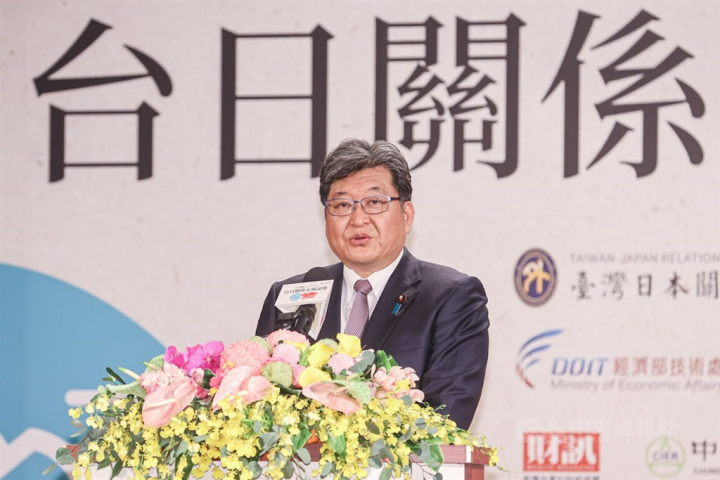
Taipei, Dec. 11 (CNA) A visiting senior member of Japan's ruling party on Sunday expressed his support for Taiwan's bid to join a Tokyo-led trade bloc, but raised concerns over the nation's partial ban on some Japanese food imports, calling for its removal as soon as possible.
Koichi Hagiuda, the policy chief of Japan's Liberal Democratic Party (LDP), said at a Taiwan-Japan relations forum held in Taipei that he personally supports Taiwan's bid to join the Comprehensive and Progressive Agreement for Trans-Pacific Partnership (CPTPP).
Hagiuda said the main reason for Japan to take over the trade bloc, which grew out of the Trans-Pacific Partnership abandoned by the United States in January 2017, is because its government believes in the importance of promoting free and fair trade, which will serve as the foundation for Japan's prosperity in the next 100 years.
"We do not want to work with those trading partners that we cannot put our trust in," he said, adding that is not the case with Taiwan because it is a trustworthy trade partner that Japan shares deep connections with on various fronts.
It is Tokyo's stance that it welcomes all aspiring CPTPP members that can comply with the high standards of the trade bloc, according to Hagiuda.
He lauded Taiwan for deciding in early 2022 to partially lift a decade-long ban on food imports from areas affected by the 2011 Fukushima nuclear disaster in Japan, namely Fukushima, Gunma, Chiba, Ibaraki, and Tochigi.
However, there's still a partial ban on food imports from these five prefectures, he said, calling on Taiwan's government to remove it "based on science."
Taiwan currently bans the imports of mushrooms, the meat of wild birds and other wild animals, and "koshiabura" (漉油菜) (foraged vegetables), as well as some other items from the nuclear disaster-hit Japanese prefectures.
Most other countries have lifted their bans on products from the prefectures though they continue to monitor food imports from the five areas for radioactive substances.
CPTPP is one of the world's biggest trade blocs, representing a market of 500 million people and accounting for 13.5 percent of global trade.
For a new member to join the CPTPP, all 11 signatories -- Australia, Brunei, Canada, Chile, Japan, Malaysia, Mexico, New Zealand, Peru, Singapore, and Vietnam -- must approve the application.
Taiwan applied on Sept. 22 last year to join the CPTPP, less than a week after China submitted its application.
In his keynote address during the "Taiwan-Japan Trade and Economic Sustainability Forum," Hagiuda, who most recently served as Japan's economics minister from October 2021 to August 2022, outlined the close relations between the Tokyo and Taipei despite the lack of official diplomatic ties.
He also shared both countries' common security threat from China, as exemplified by a serious of drills conducted by Chinese military forces in August following U.S. House Speaker Nancy Pelosi's visit to Taiwan.
Some of the ballistic missiles fired by Beijing during the drills landed in Japan's exclusive economic zone (EEZ), leading to Tokyo's protest.
Hagiuda, a close aide of late Japanese Prime Minister Shinzo Abe, quoted Abe as saying that the developments were proof that a "Taiwan emergency is a Japanese emergency, and therefore an emergency for the Japan-U.S. alliance."
Beijing showed its displeasure at Pelosi's 19-hour visit, the first by a sitting U.S. House speaker to Taiwan in 25 years, by launching large-scale military drills in waters around Taiwan, which went beyond previous routine fighter jet activities in Taiwan's self-declared air defense identification zone.
As part of the drills, Japan confirmed that China fired a total of nine missiles from around 3 p.m. to after 4 p.m. on Aug. 4, while Taiwan said it observed 11.
According to the Japanese government, five of the missiles landed in Japan's EEZ.
Hagiuda is the first policy chief of the LDP to visit Taiwan in nearly 20 years. The only other Japanese ruling party's senior official to visit Taiwan was Taro Aso, who did so in 2003 when he served as the then-policy chief of the LDP.
The one-day forum was organized by the Taiwan-Japan Relations Association and the Japan-Taiwan Exchange Association. The two organizations handle Taiwan-Japan relations on behalf of respective countries in the absence of official diplomatic ties.
The forum was joined by former Japanese ambassador to China, Sakutaro Tanino, as well as Japanese lawmakers and scholars.